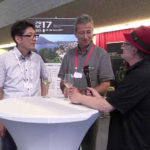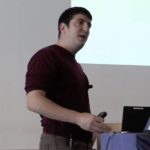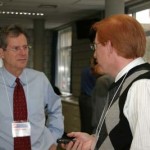June 20, 2022 — The Partnership for Advanced Computing in Europe (PRACE) has announced that the first edition of the PRACE HPC Excellence Award has been awarded to the team of Nicola Marzari of EPFL (École polytechnique fédérale de Lausanne) and NCCR MARVEL (a centre on Computational Design and Discovery of Novel Materials created by the Swiss National […]
Swiss HPC Conference to Focus on Intersecting Interests, Industries, and Initiatives
Coming up in April, AI and HPC practitioners share passions for cutting-edge technology and breakthrough R&D in Lugano, Switzerland at the tenth annual Swiss Conference and HPCXXL User Group. The joint sessions take place at Palazzo dei Congressi, April 1-4, bringing leaders together from academia, government and industry to share first-hand insights on innovative research, techniques, tools and technologies that are fueling economies, productivity and progress globally.
Interview: The Computational Challenges of Fusion Energy
In this video from PASC17, Yasuhiro Idomura from the Japan Atomic Energy Agency and Laurent Villard from EPFL discuss the computational challenges of developing Fusion reactors. “Numerical plasma physics models are used to improve our understanding of transport, instability growth and other poorly understood phenomena encountered in the experimental devices edging toward viable fusion energy. Since computational expense imposes a major limitation on accurate physical modeling, computational resources must be used as efficiently as possible.”
Video: Computational Discovery in the 21st Century
Nicola Marzari from EPFL gave this public lecture at PASC17. “The talk offers a perspective on the current state-of-the-art in the field, its power and limitations, and on the role and opportunities for novel models of doing computational science – leveraging big data or artificial intelligence – to conclude with some examples on how quantum simulations are accelerating our quest for novel materials and functionalities.”
SPACK: A Package Manager for Supercomputers, Linux, and MacOS
“HPC software is becoming increasingly complex. The space of possible build configurations is combinatorial, and existing package management tools do not handle these complexities well. Because of this, most HPC software is built by hand. This talk introduces “Spack”, an open-source tool for scientific package management which helps developers and cluster administrators avoid having to waste countless hours porting and rebuilding software.” A tutorial video on using Spack is also included.
Agenda Posted for HPC User Forum in Tucson, April 11-13
IDC has published the agenda for their next HPC User Forum. The event will take place April 11-13 in Tucson, AZ. “Don’t miss the chance to hear top experts on these high-innovation, high-growth areas of the HPC market. At this meeting, you’ll also hear about government initiatives to get ready for future-generation supercomputers, machine learning, and High Performance Data Analytics.”









